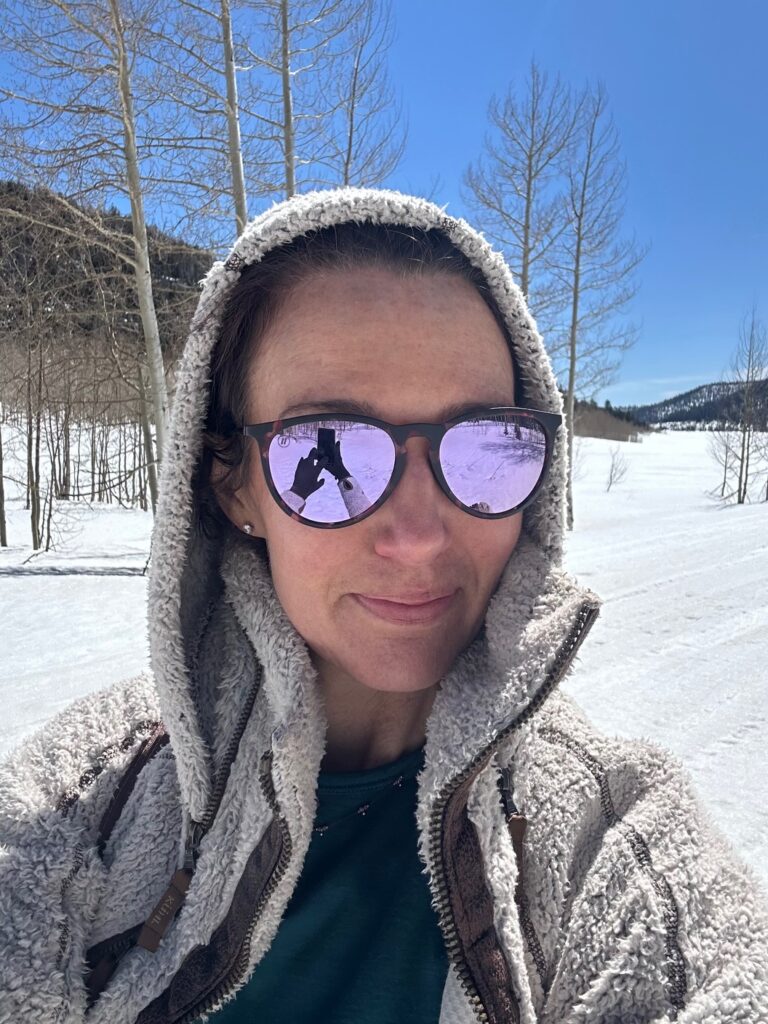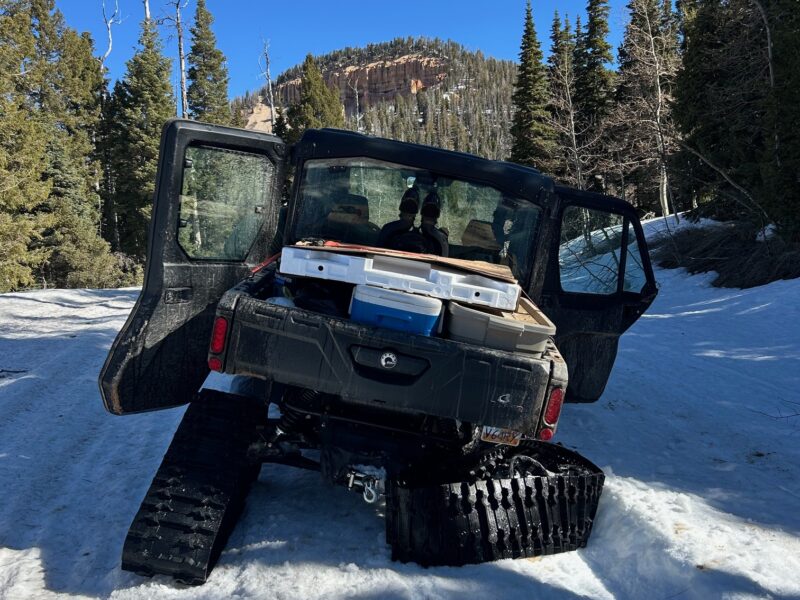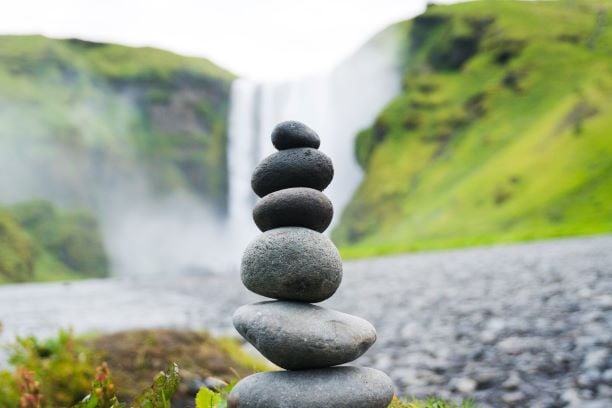(Want to listen to this post? Skip to the bottom!)
We knew it would happen eventually, living down an unplowed road in snow season.
We got stuck driving our tracked utility vehicle from our homestead to our car (parked at the plowed highway).
Today I’ll share what happened, how we handled it, and what I learned in hopes that maybe you can learn something too about how to deal with being lost or stuck.
As background, the road from the main highway to our property is covered in snow from about December/January to May. There’s always another way out of our area by continuing down the unplowed road, onto the dirt, and then through Zion National Park. But if you want to go the most direct way in the winter and spring, you need to have tracks.
It’s not the most comfortable ride, and it’s loud, so we usually pop in headphones and listen to podcasts or music on our own between home and car.
Ironically, I was listening to an episode of the podcast 2% with Michael Easter, where he was talking about the benefits of getting lost. He shared a situation that he had been in with his cousin getting lost in the desert on a hike. He talked about how in modern days, people very seldom get lost. He argues that getting lost can really up your resilience because it teaches you to be raised, focused and mindful. It teaches you your weaknesses in planning, your gear, your physical abilities, maybe even your thinking patterns. It also makes for good memories and stories that you definitely won’t forget.
A few minutes after I was sharing these insights with my husband, we were climbing slightly up a little a hill toward the lake, and I felt something unusual. Then there was a grinding sensation under my feet.
“Something’s wrong, you should stop,” I said.
We both stepped outside to see that one of the four snow tracks had completely sheared off. It was turned 90 degrees onto its side, grinding down into the snow. After uttering some four-letter words and exclamations of disbelief, we had to collect ourselves and figure out what to do. The kicker: we were exactly five miles away from our home and five miles away from where we keep our car. And we had our child, our geriatric dog (who does not do well in snow) and a vehicle full of stuff that we were taking to town.

The things I realized in this experience aren’t just for when you literally get lost or stuck. They can also apply to when you get the feeling of being lost or stuck. Most of the time when I’ve had an inquiry for my coaching services, the person who is inquiring is either feeling lost or stuck in some way. And this can look like a few different things:
- You know that you’re not your best self, but you don’t know what you want or how you want things to look. You might be unsure.
- You’re crowdsourcing for answers, but you’ve lost touch with your own intuition.
- You might have a new opportunity for a specific work change or job, but you just can’t make a decision.
- You have a particular vision that feel like there are too many obstacles in front of you to make the changes needed, to realize the vision.
So what can you do?
Don’t catastrophize
This should go without saying, and I think most adults are pretty good at this, but kids are definitely not. Our child behaved pretty well in this situation. She complained more about being bored than anything.
But I remember when I was a little bit older than my daughter is now, and our car broke down on the interstate. I was so scared. I remember thinking (and shouting out loud) that we were all going to die. Obviously, this was not true, nor was it helpful for the situation… and actually, it could have been detrimental. It takes energy and focus away from solving the actual problem.
In our recent situation, my brain was categorizing the elements of the situation as good or bad. The “bad” was we were a far walk from our home and we were a far walk to the car. But they were both doable. The “good” was we had phones. The road has spotty cell service, but we know where the spots are. We had water and food. And it wasn’t a bad weather day. The snow was kind of slushy, which is probably part of what caused the problem, but the weather was nice and we weren’t going to freeze.
Remember that, evolutionarily, catastrophizing did help us as a human race. It’s very normal to feel like the world’s going to end even when you’re just metaphorically stuck, but it’s not the case now. The problems that you’re likely encountering have a worst-case scenario that’s not even really that bad. Visualize it to diffuse its strength in your mind and gain some perspective on what might happen. Focus on what is more likely to happen. What would you bet your money on? Discard the rest.
Slow down and focus
That day, we methodically thought about different ways we might be able to temporarily fix the track with the tools we had. Once we realized that none of our ideas worked, we moved onto the next possibility, which was that someone was going to have to come and get us and we’re going to have to leave the vehicle in the snow temporarily. There is only one full-time neighbor down that road with the same kind of tracked UTV. She would be our first call. And if that didn’t work, we had a second person identified. The third option would be to call the county sheriff and have them come to get us.
When you focus and mono-task, you remove distractions. You become mindful of every detail and you live fully in the present. If you’ve been reading the blog for a while, you know how much of a fan I am of having a regular mindfulness practice for all different aspects of your life. I encourage you to tap into it when you need clarity, if you’re feeling lost or stuck, it’s the key to building those mental muscles.
Take a break
If you’re lost or stuck and you exhaust all your options – or you’re just exhausted – consider taking a break. You can’t be at your best problem solving abilities unless you replenish your energy. Think about something else or spend a little time alone, reflecting. Then go back to brainstorming afterwards.
So how did our situation resolve?
We decided one of us needed to walk the mile or so in the snow to get the cell service, so it ended up being me and the rest of them stayed behind at the UTV. I called our one neighbor, and luckily she answered her phone. She came a little while later and took us to our truck at the end of the road a few days later, my husband and some friends recovered the injured UTV. We were very fortunate,that this happened in the spring and not in the middle of a horrible blizzard or something like that. The key thing is we didn’t panic and we worked together to solve it.
Have you ever had a thing like this happen to you? Are you feeling stuck right now? Send me a message or leave a comment and tell me about it!
Listen to the podcast version of this post here:



 Lean Out Podcast: Spirituality with Erin Doppelt
Lean Out Podcast: Spirituality with Erin Doppelt

Those utility vehicles comes very handy, especially in the mountains area
Thanks! And yes, they do!
This is just amazing how they pulled that off
https://youtu.be/VQDTFY0pmgc?si=lOvMrycYf1-3vF4Q
keep building, prepping backing up stuff like never before, your homestead location is one of the best